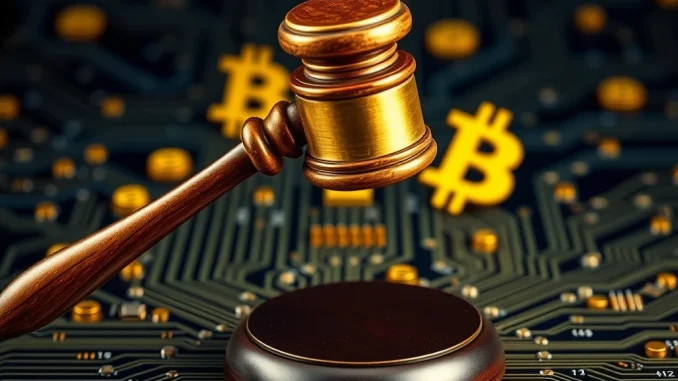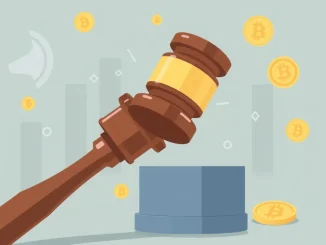
In a surprising turn of events that has sent ripples through the cryptocurrency community, the U.S. Department of Justice (DoJ) has reaffirmed its commitment to prosecuting Do Kwon, the controversial co-founder of Terraform Labs. This announcement comes despite the recent disbandment of the DoJ’s dedicated cryptocurrency investigations unit, raising questions about the future of crypto regulation enforcement. But fear not, crypto enthusiasts, because as it stands, the wheels of justice continue to turn in the Do Kwon criminal case.
Why is the Do Kwon Criminal Case Still Proceeding?
The core reason behind the unwavering prosecution lies in the nature of the charges against Do Kwon. According to CoinDesk reports, the prosecution emphasized that the indictment against the Terraform Labs co-founder is fundamentally rooted in fraud and conspiracy to commit fraud. This is a crucial distinction. Unlike cases that hinge on the classification of cryptocurrencies as securities, the charges against Kwon are based on established criminal statutes related to deceit and financial manipulation.
Think of it this way:
- Focus on Fraud: The DoJ’s case zeroes in on alleged fraudulent activities, which are illegal regardless of whether the asset involved is a traditional security or a cryptocurrency.
- Alternative Criminal Charges: The prosecution has clarified that even if debates arise about cryptocurrency classifications, existing criminal charges related to fraud provide a solid legal foundation for the case.
- NCET Disbandment Irrelevant: The disbandment of the National Cryptocurrency Enforcement Team (NCET) and the revised enforcement guidelines, while significant for the industry’s regulatory landscape, do not directly impact pre-existing criminal cases like Do Kwon’s which are based on fraud.
Essentially, the DoJ is saying, “Regardless of the evolving regulatory approach to the crypto industry, alleged crypto fraud is still fraud, and we will prosecute it as such.”
What Does This Mean for the Future of Crypto Enforcement?
While the Do Kwon criminal case remains unaffected, the broader context of the DoJ’s recent decisions does signal a potential shift in how the U.S. government approaches cryptocurrency regulation and enforcement. Let’s break down what we know:
DoJ Restructuring and Enforcement Priorities:
The disbandment of the NCET and the formalization of new guidelines indicate a possible recalibration of the DoJ’s strategy. This doesn’t mean the DoJ is abandoning crypto enforcement altogether, but rather, it might be adopting a more streamlined or integrated approach. It suggests a move away from a specialized unit towards incorporating crypto expertise within existing investigative and prosecutorial teams.
Focus on Securities and Commodities Laws:
The new guidelines explicitly state that the DoJ will not automatically hold Terraform Labs or other cryptocurrency industry personnel legally accountable for mere violations of federal securities and commodities laws. This is a noteworthy development. It implies a more nuanced approach, potentially focusing enforcement on cases involving clear intent to defraud or harm investors, rather than solely on technical regulatory breaches.
The Implications for Crypto Businesses:
This shift could be interpreted as a signal of reduced regulatory intensity in certain areas of the crypto space. For businesses operating within the cryptocurrency industry, this might bring a sense of relief from overly broad enforcement actions. However, it’s crucial to understand that this does NOT grant a free pass for illicit activities. Criminal cases related to fraud, money laundering, and other serious offenses will likely remain a priority.
Key Takeaways: Navigating the Evolving Crypto Legal Landscape
So, what can we glean from these developments?
- Fraud Remains a Red Line: Regardless of regulatory shifts, criminal activities like fraud in the cryptocurrency space will continue to be vigorously pursued by law enforcement agencies. The Do Kwon case is a testament to this.
- Nuanced Regulatory Approach: The DoJ’s actions suggest a move towards a more refined regulatory approach, potentially focusing on egregious violations and intentional misconduct rather than strict adherence to every aspect of securities or commodities laws.
- Importance of Compliance: While the regulatory landscape might be evolving, crypto businesses must prioritize compliance. Robust internal controls, transparency, and ethical practices are paramount to avoid legal pitfalls, especially those related to fraud.
- Stay Informed: The cryptocurrency legal and regulatory environment is dynamic. Staying updated on the latest developments, guidelines, and enforcement actions is crucial for anyone involved in the crypto industry.
In Conclusion: Justice Marches On in the Do Kwon Saga
The news that the Do Kwon criminal case is proceeding unaffected by the DoJ’s restructuring provides a clear message: the pursuit of justice in cases of alleged crypto fraud remains steadfast. While the broader regulatory winds may be shifting, the fundamental principles of law enforcement – particularly against fraud and conspiracy – endure. For the cryptocurrency world, this serves as a potent reminder that while innovation and evolution are welcomed, the bedrock of trust and legality must always be upheld. The criminal case against Do Kwon will undoubtedly be a closely watched event, setting precedents and offering valuable insights into the future of crypto regulation and enforcement. Keep your eyes peeled for further updates as this captivating legal drama unfolds.



